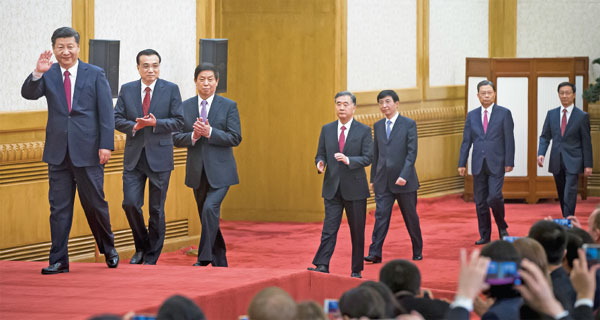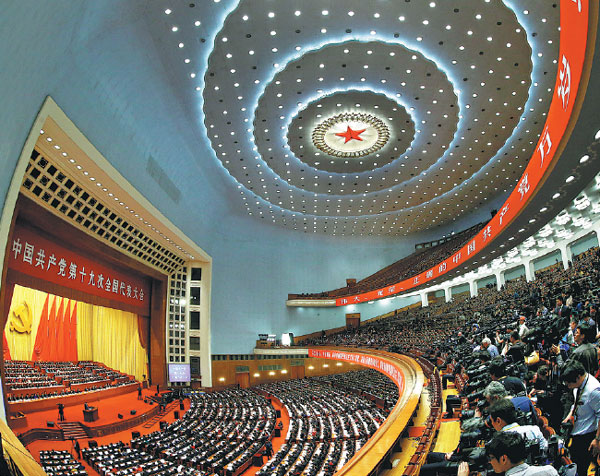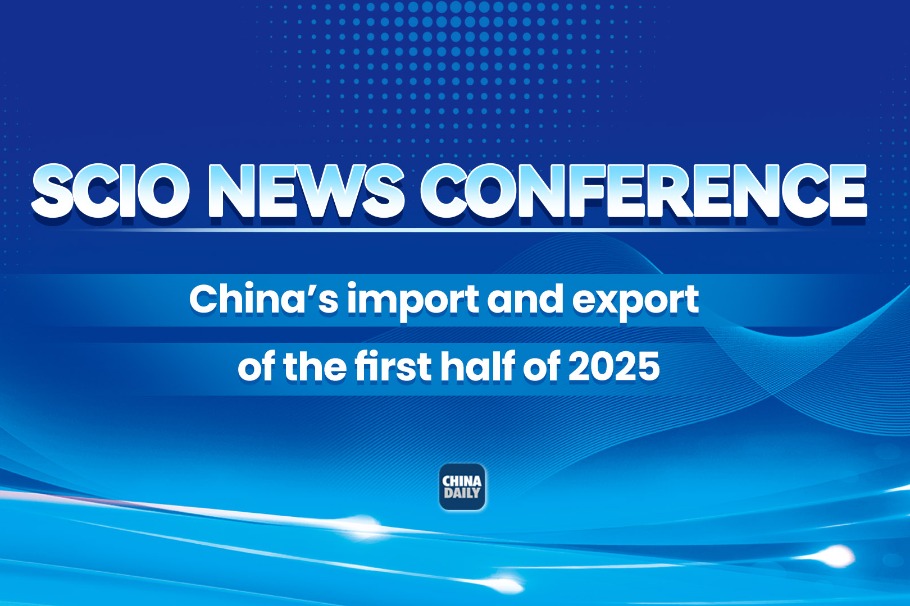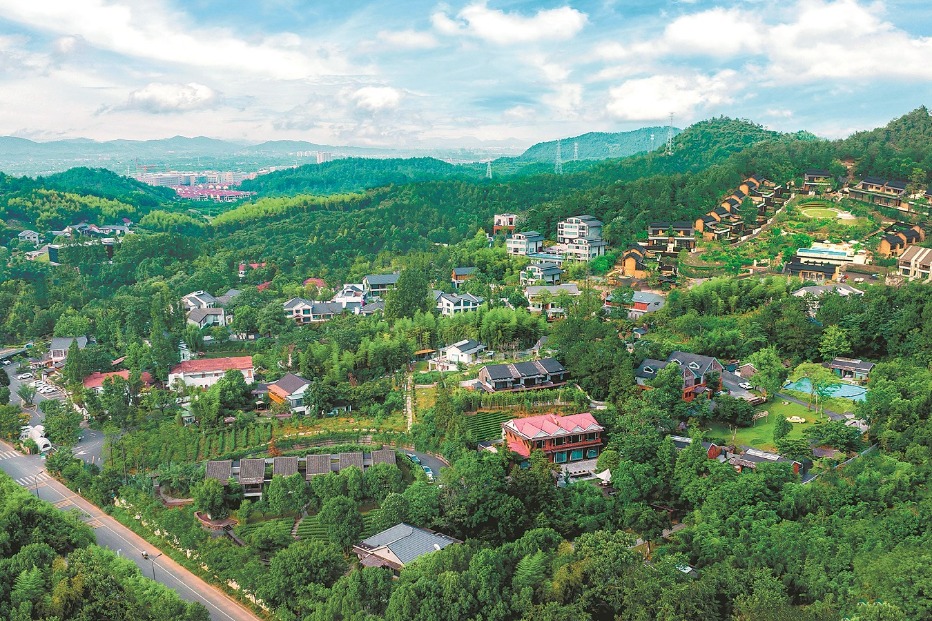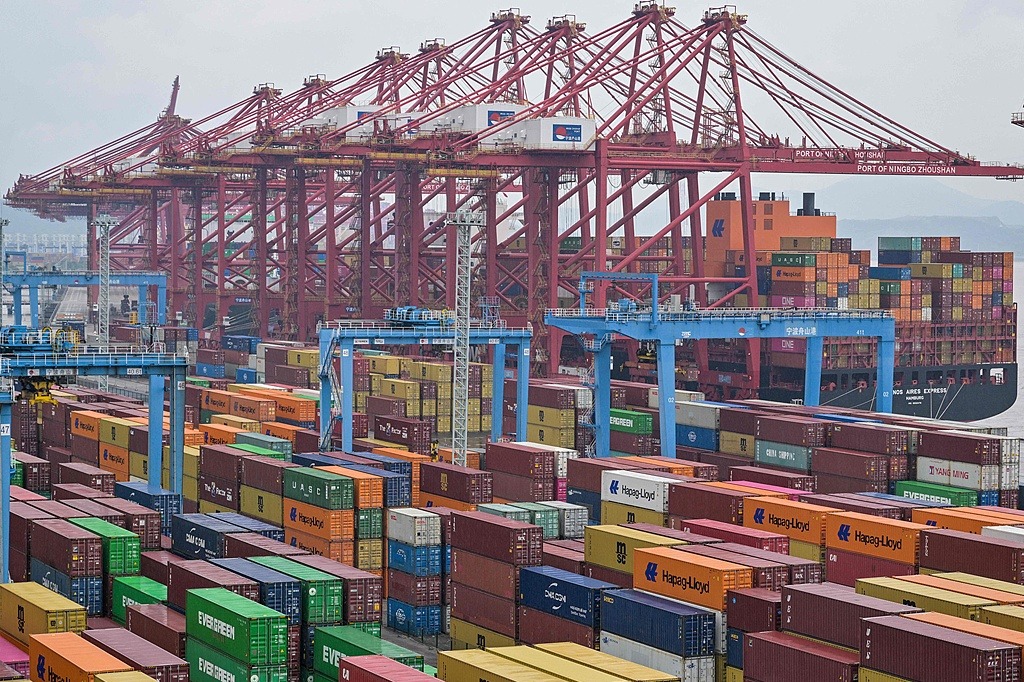March to rejuvenation

Party congress garners great international attention, given new importance of China on world stage
China is set on course for "national rejuvenation" after the conclusion of the Communist Party of China's 19th National Congress, according to CPC Central Committee General Secretary Xi Jinping.
Xi, also president, told the closing session of the weeklong meeting that the country could now move forward with renewed confidence.
"The Chinese people and the Chinese nation embrace brilliant prospects. Living in such a great era, we are all the more confident and proud and also feel the heavy weight of responsibility upon us," he said.
| Xi Jinping, general secretary of the Central Committee of the Communist Party of China, and the other newly elected members of the Standing Committee of the Political Bureau of the 19th CPC Central Committee Li Keqiang, Li Zhanshu, Wang Yang, Wang Huning, Zhao Leji and Han Zheng arrive to meet the media at the Great Hall of the People in Beijing on Oct 25. Xu Jingxing / China Daily |
"We must keep on striving with endless energy toward the great goal of national rejuvenation."
One of the significant outcomes of the meeting was for Xi Jinping Thought on Socialism with Chinese Characteristics for a New Era to be enshrined in the Party's Constitution.
It now sits with Mao Zedong Thought, Deng Xiaoping Theory, the Three Represents, former general secretary Jiang Zemin's ideological contribution, and the Scientific Outlook on Development, the guiding principle of Xi's immediate predecessor, Hu Jintao.
China now has a new leadership in place with the Standing Committee of the Political Bureau of the 19th CPC Central Committee unveiled on Oct 25.
Apart from Xi and Premier Li Keqiang, it consists of five new members: Li Zhanshu, director of the general office of the CPC Central Committee; Wang Yang, 62, Chinese vice-premier; Wang Huning, 62, director of the Central Policy Research Office; Zhao Leji, 60, the Party's personnel chief; and Han Zheng, 63, Party secretary of Shanghai.
The 204 new and 172 alternate members of the CPC Central Committee were elected by more than 2,300 delegates on Oct 24.
The congress has been one of most closely observed internationally, given the new importance of China on the world stage.
Many in the developing world, in particular, now see China as a role model, particularly with its goal of becoming a "moderately well-off society" and thus breaking out of the so-called middle-income trap by 2020.

Gordon Houlden, director of the China Institute at the University of Alberta in Canada and a former Canadian diplomat in Beijing, believes developing countries, particularly in Africa, can learn many things from China.
"I had the privilege of meeting Deng Xiaoping on one of our prime minister's visits, and I think China is now at a point way beyond even where Deng ever anticipated," he says.
"I know the African continent particularly well, and where they can learn is from the export-led development model, the building of infrastructure, the emphasis on education and also seeking to be very open in terms of their choice of economic partners."
Martin Jacques, a British journalist and author, and now visiting professor at the China Institute at Fudan University in Shanghai, says the congress will have been closely watched in the developing world.
"The developing world, of which China is still a part, is now very much led by China, whom they see as a role model," he says.
"This is more difficult for the developed world. The view there has been that China is not like us and therefore it is not going to make it. It will be interesting if that perception changes when the Chinese economy continues to be a success, while the developed world continues to fall behind as it has done after the global financial crisis."
Kevin Rudd, the former Australian prime minister, writing in the Financial Times, said Xi had a long-term vision and aimed for China to be "a global leader of composite national strength and international influence" by 2049, the 100th anniversary of the founding of the People's Republic of China.
"The West needs to reflect on its own condition. Since the fall of the Soviet Union, there has been little strategic direction about the idea of the West itself, and the core elements of the liberal democratic and capitalist project," he argued.
"Instead, the West is increasingly self-absorbed, self-satisfied and globally complacent. China is marching toward its perception of its global destiny. It has a strategy. The West has none."
Arthur Kroeber, managing director of Gavekal Dragonomics, a Beijing-based research organization and the author of China's Economy: What Everyone Needs to Know, says the Western view that China's system of government gets its legitimacy just from economic growth racing ahead is simply wrong.
"(The Chinese government) is strong, increasingly self-confident. Its economic management is competent and pragmatic. ... It derives real legitimacy from its consistently demonstrated ability to raise living standards, provide a growing range of public goods and maintain a high level of order while mostly letting people do what they want in their daily lives," he wrote in China-File, the online magazine of the Asia Society's Center on US-China Relations.
Yazini April, a research specialist at the Human Science Research Council, based in Pretoria, says the benefits that China delivers for the people make the Chinese model attractive to Africans.
"China's economic developmental path makes an interesting case study which can contribute toward a better understanding of economic growth, stability and development," she says.
She believes there is a major question as to whether African governments can deliver similar results.
"The continent cannot replicate China's economic model without setting up a strong foundation of performance legitimacy by the state. Unfortunately the continent hosts many weak states. The CPC with its recent 19th National Congress has basically demonstrated the need for a strong state foundation in order to succeed in the global economy," she says.
What was clear from the congress was the sheer political experience of China's political leaders.
All the new members of the Standing Committee of the Political Bureau of the 19th CPC Central Committee have had long careers in government at senior levels, a number of them being Party secretaries of provinces with economies bigger than many European and African countries.
Houlden, who had senior roles in the Canadian embassy in Beijing in the 1980s and again from 2001 from 2004, says the wealth of experience of Chinese leaders was evident in Beijing during the congress.
"When I lived in Beijing, you were always dealing with a minister who had extensive experience of either that ministry or other government experience. In the West, a minister might arrive with good political sense and, hopefully, good judgment, but without any in-depth knowledge. He or she then becomes increasingly dependent on their staff," he says.
The diplomat-turned-academic says that what also impresses him is how the system allows for new talent to emerge, such as with the election of the new CPC Central Committee.
"The turnover in the government and the military is absolutely essential or you would have the problem of people doing the same thing for 30 years, and there would be no room for bringing in new ideas. The China system only works if it doesn't become ossified."
One of the major themes of Xi's report to the congress was poverty reduction. The government aims to lift all rural residents out of poverty in China by 2020, when it becomes a "moderately prosperous society".
April says Xi's book Up and Out of Poverty has been of great interest in Africa, particularly in relation to how local, and not national, governments can play a role.
The book records the time when Xi was Party chief of Ningde prefecture of Fujian province in the late 1980s and focused on delivering reforms in agriculture and fisheries, which has since transformed the local economy.
"The book demonstrates poverty reduction and economic growth at the local government level, which can only happen through a strong state," she says.
Tackling China's environmental problems was also a major theme of the congress.
Xi referred to creating a "Beautiful China" in his report, which is a classical reference relating to people living in harmony with their environment.
Li Ganjie, minister of environmental protection, told a news conference on Oct 23 that taking tough measures to tackle pollution and other environmental damage will benefit everyone.
He pointed to the concentration of PM2.5 - hazardous particulate matter with diameter of 2.5 microns or less - in the Beijing-Tianjin-Hebei region and the Yangtze and Pearl river deltas being brought down by 30 percent in the three years up to 2016.
"While addressing domestic environmental issues, China is also playing an active role in global environmental governance. China ... is becoming an important player, contributor and leader in the global development of ecological civilization," he said.
One of the focuses of the meeting was how China's 5,000-year history of civilization, to which Xi made reference in his report, informs the choices China now makes.
"Our nation created a splendid civilization, made remarkable contributions to mankind and became one of the world's greatest nations. But with the Opium War of 1840, China was plunged into the darkness of domestic turmoil and foreign aggression," Xi said.
Jacques stressed in his seminal book When China Rules the World that China was, in fact, a civilization and not just a nation state and that its rise could challenge existing norms.
"My central argument is very simple. Western modernity is not eternal and not a universal model. Although it is not certain, there has to be now a very strong possibility that China will become a global power and people now need to think what this new Chinese modernity will be like."
andrewmoody@chinadaily.com.cn
| A general view shows delegates attending the opening of the 19th National Congress of the Communist Party of China in Beijing on Oct 18. Thomas Peter / Reuters |
(China Daily European Weekly 10/27/2017 page16)
















